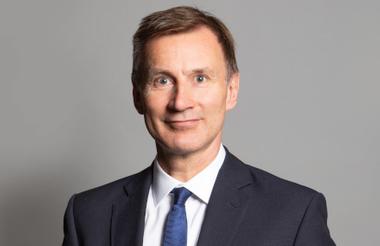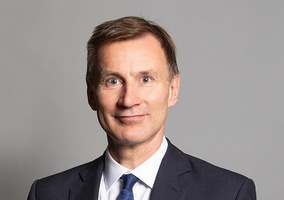There is a risk of conflicts of interest in how the chancellor of the exchequer’s charity's finances are scrutinised, lawyers have argued.
Last week, Civil Society News revealed that Jeremy Hunt’s charity Patient Safety Watch was independently audited by Grunberg & Co, a company founded by one of the charity’s trustees.
It also paid its only employee two-thirds of its annual income last year. It's only employee is chief executive Adam Smith, Hunt's former aide who resigned in 2012 following a lobbying scandal.
Companies House records show that David Grunberg, a trustee of Patient Safety Watch and founder of Grunberg & Co, resigned from the accounting company in April 2019, months before becoming a trustee of Hunt's charity.
Grunberg & Co’s office is filed as the charity’s official address on the charity's accounts and Patient Safety Watch's phone number redirects to the firm.
Benjamin Grunberg is the director of the accounting firm. Gedalia Waldman, head of audit at Grunberg & Co, has conducted the independent audit of Patient Safety Watch’s accounts for the last two years.
The Charity Commission is currently assessing complaints about the charity against its risk framework to determine whether it is a matter for the regulator.
Civil Society News contacted Patient Safety Watch and Hunt for comment but did not receive a response.
‘Certainly a risk’
Charity solicitor at VWV, Shivaji Shiva, has said this arrangement could create a risk to the charity.
“There is certainly a risk that this arrangement will be perceived as affecting the independence of the examiner. An independent examiner should be exactly that: independent.
“The Commission's guidance on independent examination (CC32) makes clear that independent examiners should not be involved in the day-to-day involvement in the administration of the charity concerned and they should also consider the risk of a perception that they are not truly independent: 'The examiner must ensure that there are no matters and no potential matters that would reasonably give rise to a perception [that they could not] carry out the examination in a wholly objective manner'.”
Philip Kirkpatrick, a charity expert at Bates Wells, highlights that the charity’s constitution does authorise the engagement of Mr Grunberg’s company to provide services, provided that the conflict has been properly managed.
“However, there must be a question whether a director or employee of Grunberg & Co could be independent, as required of an independent examiner by the Charities Act 2011. The Charity Commission has issued guidance on this, which includes the statement that 'for an examiner to be independent they must have no connection with the charity trustees which might inhibit the impartial conduct of the examination.'”
The issue of CEO pay
The latest financial accounts for Patient Safety Watch show that the chancellor’s charity paid its only employee, Hunt's former aide Adam Smith, between £110,000 - £120,000 last year. This is over two-thirds of the charity’s annual income.
In response, the Charity Commission said it does not enforce any upper limit on salaries. However, the regulator has intervened in the past over charities' payments to chief executives.
Kirkpatrick from Bates Wells said context was “vital” but that scrutiny over charity pay is likely to remain.
“There is no absolute legal limit on how much charity staff should be paid but the Charity Commission may well question proportionality and press the trustees on their decision-making. The Commission wants to know that trustees have considered relevant factors, including the impact on the charity’s reputation. They also suggest (wrongly, in my view) that trustees must consider the reputation of the charity sector as a whole when taking such decisions,” he said.
‘Politicians being attacked through their charity work’
Meanwhile, Pippa Garland, partner in the charity and social business team at law firm Russell-Cooke, criticised the recent scrutiny of Hunt's charity.
She said: “This is another example of well-known individuals, whether celebrities or politicians, being attacked through their charity work. Could this have a freezing impact on philanthropy? It is increasingly clear that far from having a ‘white washing’ effect, charity work can now be used to bring down individual’s reputations, with the charity and its work often the collateral damage.
“It is also an example of the payment of charity employees coming under increasing scrutiny. Many charities in the sector are highly professional entities, delivering critical services; and it is quite right that they pay their staff for the work they do. Study after study shows that those in the charity sector are in fact underpaid compared to those in the private sector. However, where one or two individuals in a charity are getting paid particularly high salaries, trustees must have very clear justifications, as, whether fair or not, it does not sit well with the general public.”
Related articles












